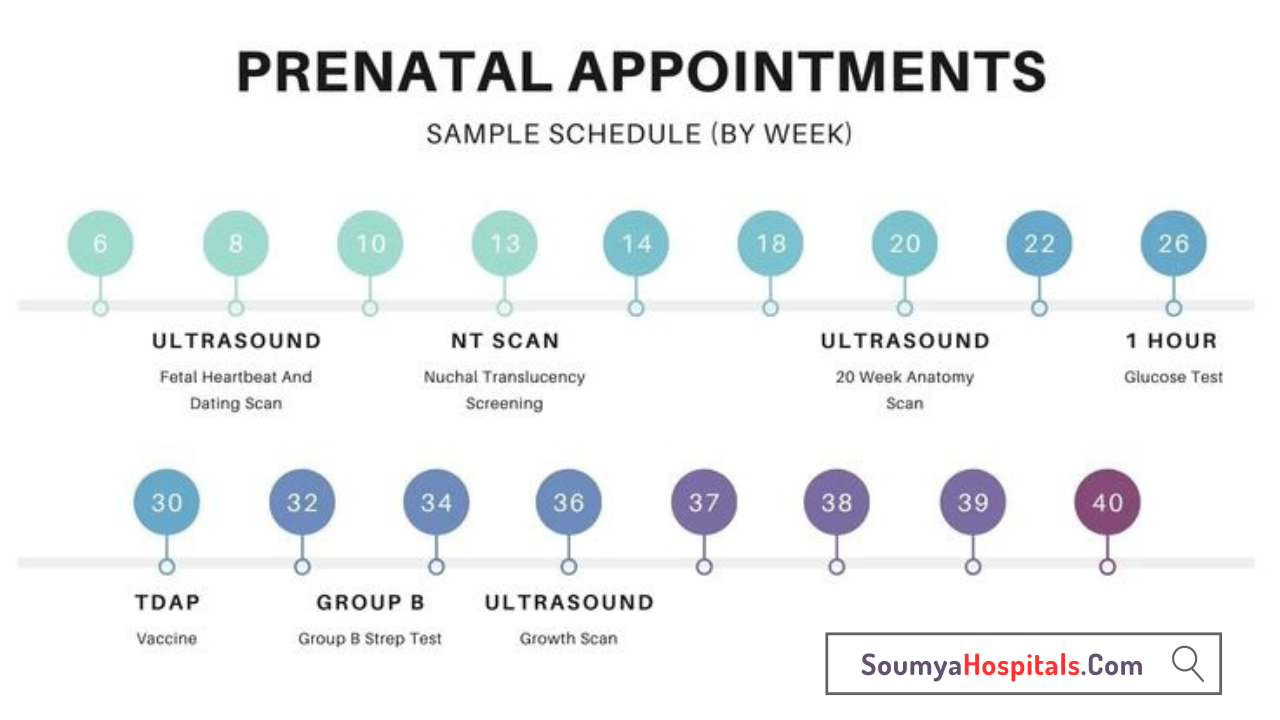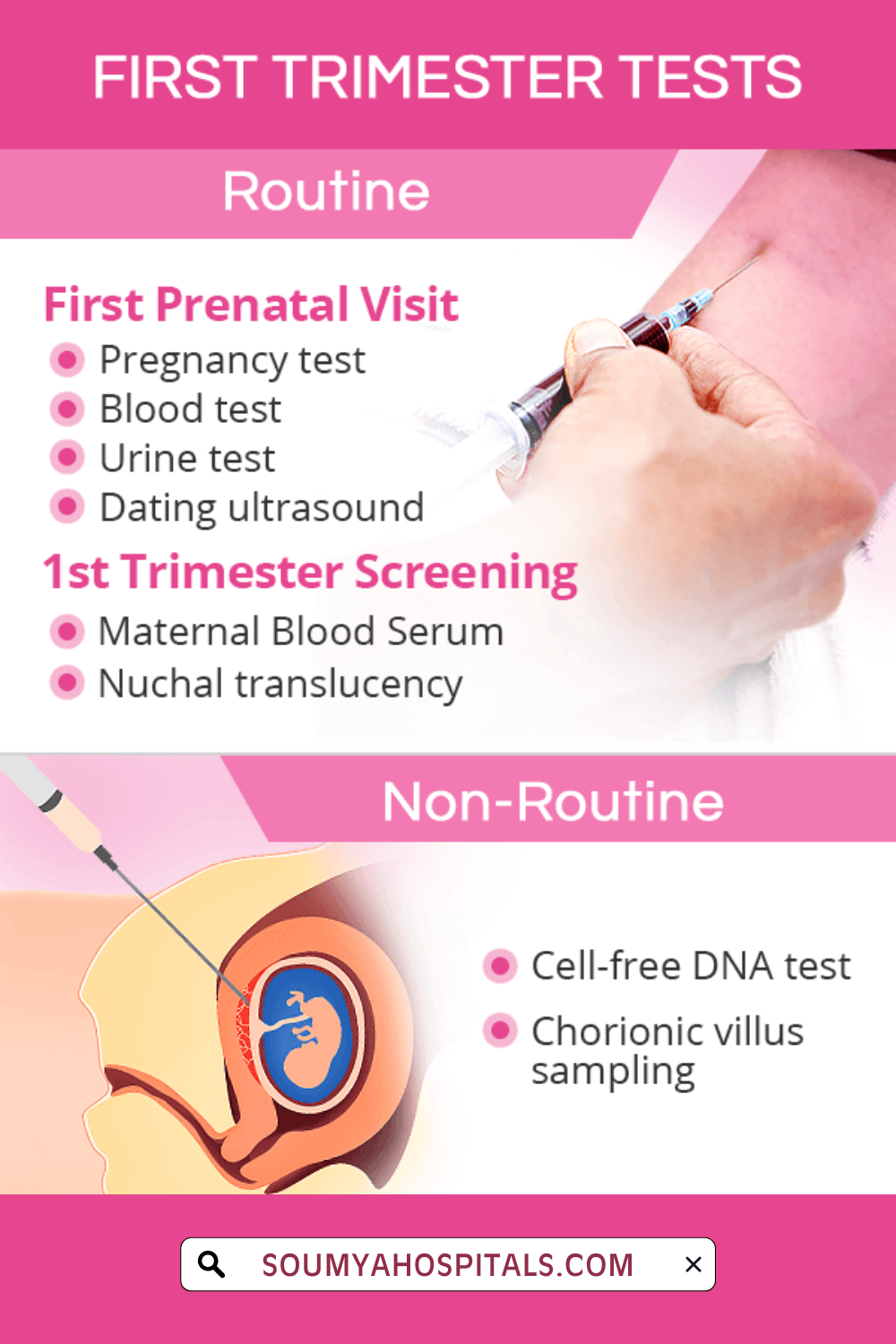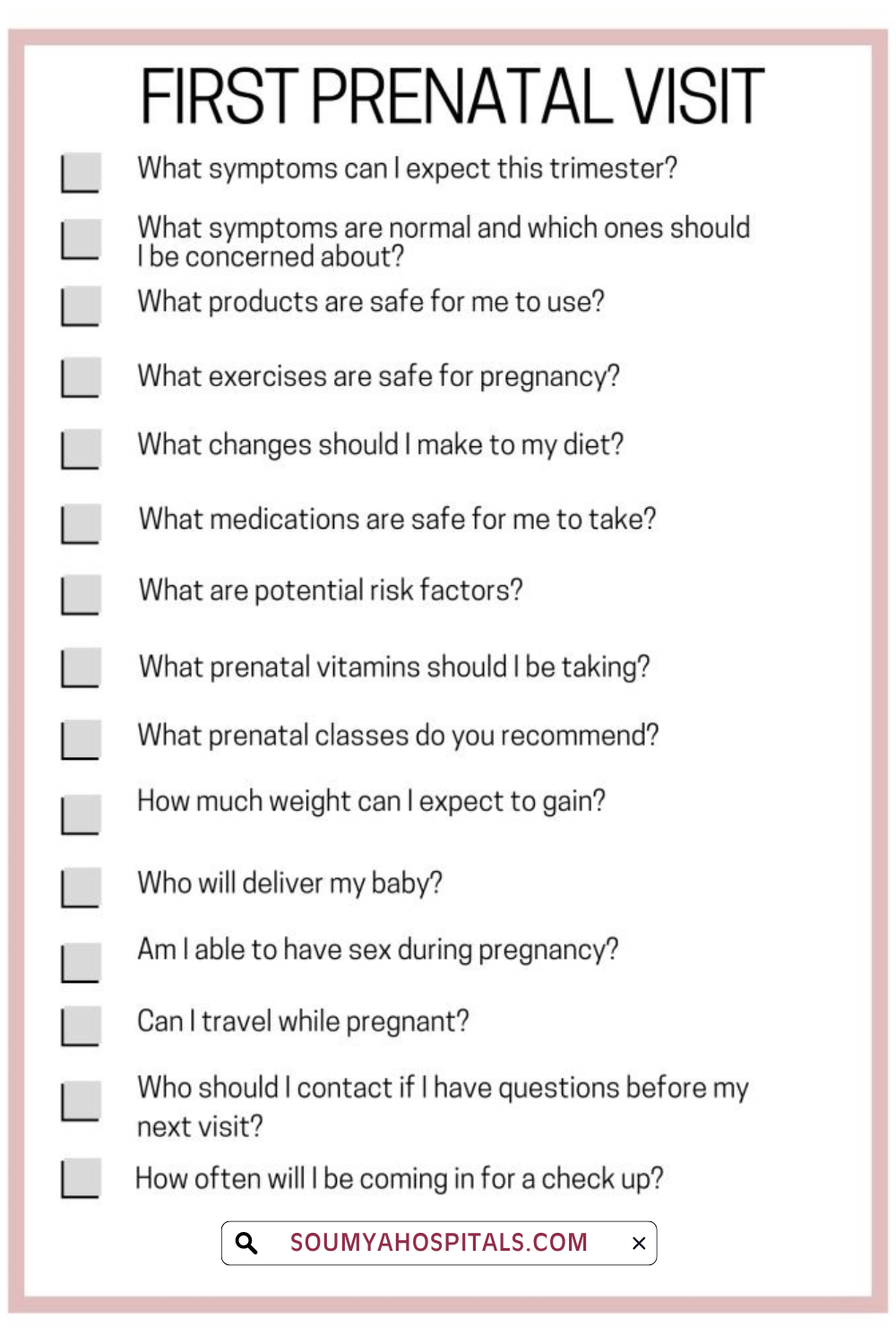Important Tests during pregnancy help check the baby's growth and health, as well as the mother's well-being.
Your pregnancy test was positive, and you may have many questions in your mind. Now it's time for your initial prenatal check-up schedule. Even if this is not your first pregnancy, your first prenatal appointment is important because every pregnancy is different.
At the first prenatal visit, the healthcare provider includes many screening tests and discusses your medical history. You have to be prepared with questions that I've been racing through your mind since the second line appeared on the stick. It's your first chance to see your pregnancy progress and plan for the future.
Learn about: Early Pregnancy USG
- When to Schedule Your Initial Prenatal Visit?
- What Happens At Your First Prenatal Visit?
- Different Screening Tests at Initial Prenatal Appointment
- Vital Stats
- Urine Sample
- Blood Test
- Blood Type and Rh Factor
- Complete Blood Count (CBC)
- Rubella Immunity Test
- Hepatitis B and C Screening
- HIV Screening Test
- Syphilis Screening
- Thyroid Function Tests
- Genetic Carrier Screening
- Health History
- Pelvic and Breast Exam
- Transvaginal Ultrasound
- Due Date Calculation
- Prenatal Care Plan
- Questions To Ask At Your First Prenatal Visit
- What to wear to the first prenatal appointment?
- Can I eat before my first prenatal visit?
- Is 10 weeks too late for the first prenatal visit?
- What is performed during the initial prenatal examination?
When to Schedule Your Initial Prenatal Visit?

There is no need to wait until after pregnancy confirmation. Call a healthcare provider after getting a positive home pregnancy test to get the ball in motion to start your pregnancy care.
It is recommended to meet the doctor between 8 weeks and 10 weeks after your last month period. In your first prenatal appointment, gynaecologists test your pregnancy and ask about your health status and medical history. She will advise you to take a prenatal vitamin.
There is no need to wait after getting a positive home pregnancy test. Soon reach a healthcare provider and start tracking your fetus's movements.
What Happens At Your First Prenatal Visit?
Your healthcare provider may do things differently based on your health and their process, but a typical first pregnancy appointment will include several tests and ask questions.
“Different providers may do things a little differently, but in general, you can expect to visit your provider regularly throughout your pregnancy to make sure you’re doing well and that the fetus is developing properly. Prenatal visits are a chance to spot any issues as early as possible,” Gaines-El Hunter notes.
Different Screening Tests at Initial Prenatal Appointment
Here is an idea on what are the tests to be performed during the first appointment.

During your first prenatal visit, your weight and height was checked. They will even check your temperature and blood pressure.
You can expect your provider to ask for a urine sample to perform a test and confirm your pregnancy. Also, check your kidney function and other things like protein in your urine.
Your provider will perform blood tests to better understand your health and any conditions you may have that can affect your pregnancy and the fetus.
During your first trimester, your provider will check your blood to determine your blood type and look for signs of:
- Blood issues such as anemia (low in iron)
- Immunity to rubella (German measles)
- Hepatitis B
- Cystic fibrosis gene
- Sickle cell anemia and other blood disorders
- Certain sexually transmitted diseases and infections
A blood test will check your blood type and Rh factor. The healthcare provider will know your blood group from blood type test. If your Rh is negative and your partner's Rh is positive, you may develop antibiotics that prove dangerous to your fetus. This can be prevented by taking an injection around the 28th week of pregnancy.
A complete blood count is used to check the overall health and find a wide range of conditions that include anaemia, infection and leukaemia. A CBC test measures the following things:
- Red blood cells, which carry oxygen
- White blood cells, which fight infection
- Hemoglobin, the oxygen-carrying protein in red blood cells
- Hematocrit, is the amount of red blood cells in the blood
- Platelets, which help blood to clot
Rubella can be a serious condition in pregnant women. If you get it in the first 4 months, your baby could have eye, hearing or heart problems or be born too soon. A technician uses a blood sample to take this test.
Hepatitis B and C are two of the most serious types that are common in the USA. Doctors have long recommended that you get tested for hepatitis B during early pregnancy.
You will be offered an HIV blood test when you have your first blood test during pregnancy. HIV screening can also be done at any time during your pregnancy. It's your choice if you want to take the test. HIV is a virus that can make you sick. It can lead to AIDS if it is not detected and left untreated.
All women should be screened serologically for syphilis at the first prenatal care visit, which is mandated by the majority of states. Pregnant women with positive treponemal screening tests should have additional quantitative testing because titers are essential for monitoring treatment response.
Thyroid hormone levels need to be tested every 4 weeks during the first half of pregnancy. The treatment is safe and essential to both mother and fetus. Routine screening for all newborns includes a test of thyroid hormone levels.
Genetic Carrier Screening is a test that can be done either by a mouth swab or blood test. The test looks for mutations in your genes that could cause a health problem for the baby. Different types of tests look for different health conditions. The test checks for Cystic Fibrosis, Sickle Cell Disease, and Tay-Sachs Disease.
Your healthcare provider will ask a few questions about your health and biological family history to tailor your prenatal visits by week to your needs. The basic questions will be as follows:
- What was the first day of your last period?
- Is this your first pregnancy?
- Do you have a history of miscarriages or gynaecological issues?
- Do you have a history of serious medical conditions, like lung disease or heart disease?
- Are you aware of any genetic conditions that may affect you or the fetus?
- Do you smoke, vape, drink alcohol in excess or use recreational drugs?
- What medications are you currently taking?
- Have you been experiencing any concerning symptoms?
Your healthcare provider may perform pelvic and breast exam. Your breasts are checked for any signs of lumps or swelling. The pelvic exam is performed to check on the health of your vagina, uterus, ovaries, fallopian tubes and cervix. They may also do a Pap smear to check any abnormalities and test for sexually transmitted diseases and infections such as:
- Chlamydia
- Gonorrhea
- HIV
- HPV
- Syphilis
Based on your pregnancy duration, your provider may perform a transvaginal USG during your first prenatal visit. This test uses "wand" which is inserted in your vagina. It uses sound waves to project images on the screen.
A transvaginal ultrasound can allow your provider to confirm your pregnancy is progressing healthily and to determine how far along you are in your pregnancy.
If your first schedule of prenatal visits comes around 10 or 12 weeks or later, your provider may use a traditional ultrasound or Doppler to check the fetal heart rate.
Based on the first day of your last period, the ultrasound and healthcare provider will calculate your estimated due date. Normally, your due date is 280 days away from the first day of your last period. That's exactly 40 weeks or 10 months.
A full-term pregnancy lasts between 37 to 42 weeks, so your actual delivery date can be quite different from your estimated date of delivery.
Prenatal Care Plan
The schedule of your prenatal care visits will based on any special circumstances or risk factors you might have. Generally, it is recommended to have follow-up visits as follows:
- Every four weeks until 28 weeks of pregnancy.
- Every two to three weeks from 28 to 36 weeks of pregnancy.
- Weekly from 36 weeks until delivery.
Questions To Ask At Your First Prenatal Visit
When you meet your provider, there may be a lot of things on your mind. Few questions to get you started:

- Is it OK to continue taking the medication I’m currently on?
- What kind of prenatal vitamins do you recommend?
- What changes should I make in my diet?
- Is it OK to continue working out (or start a new fitness routine)?
- What are some signs or symptoms I should contact you about right away?
FAQs on the First Prenatal Visit
1. What to wear to the first prenatal appointment?
Wear comfortable clothes that you can slip out easily as your healthcare provider will ask you to undress privately and put on a hospital gown to check breasts and pelvis.
2. Can I eat before my first prenatal visit?
Yes, you can eat normally before the first prenatal visit. But if you are going for the ultrasound, empty your bladder 90 minutes before the test and then consume 8 glasses of fluid an hour before exam time
3. Is 10 weeks too late for the first prenatal visit?
No, 10 weeks is not too late for the first prenatal visit. It is recommended to schedule your first prenatal appointment between week 8 and week 10 after the first day of your last period.
4. What is performed during the initial prenatal examination?
The healthcare provider will do a full physical exam, which may include a weight assessment, blood pressure check up, and breast and pelvic examination at the initial prenatal exam. They also recommend blood tests and urine tests.
Final Thought
We are expecting that the information shared here about the First Prenatal Visit are useful for you. If you have any issues or doubts, then leave a comment below. Keep in touch with our site to know more screening tests to be performed during pregnancy.
